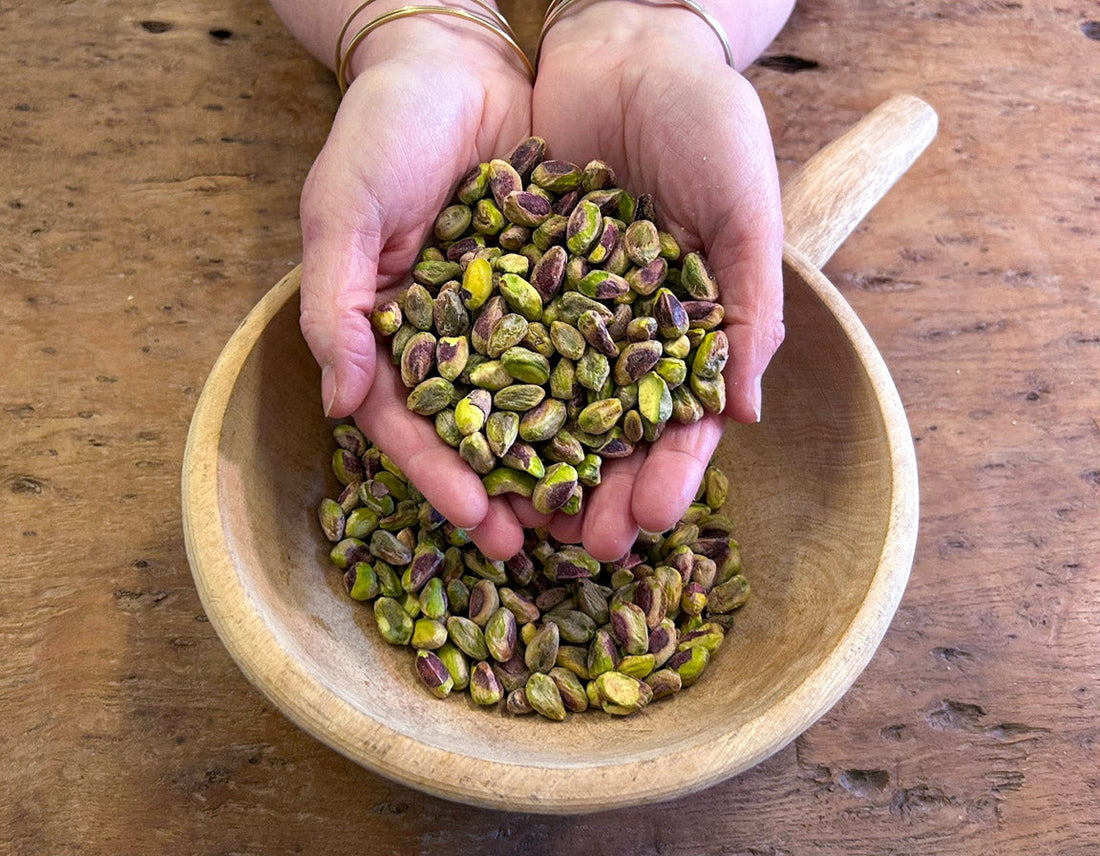
The science behind raw nuts.
Share
The 2DiE4 Live Foods Blog Series:
Why is it so important that we process nuts in raw food quality that have never been heated?!
Part 1: The Science Behind Raw Nuts – Why Heat Changes More Than You Think
Nuts are a true superfood – rich in healthy fats, vitamins, minerals, and antioxidants. But what many don’t know: Most nuts sold as "raw" are actually heated or pasteurized, killing the living germ. Industrial processing results in a loss of valuable nutrients and enzymes. Why does this happen, and why is it so important that our organic nut farmers provide us with truly germinable raw food quality? How can you benefit from this? This article gives you scientifically-backed answers.
Table of Contents
- Why are almost all nuts heated, even when sold as "raw"?
- What are the disadvantages of heated nuts?
- Why are organic raw nuts the better choice?
- Conclusion: What we at 2DiE4 Live Foods consider when selecting our organic nut farmers
Why are almost all nuts heated, even when sold as "raw"?
Most industrially processed nuts are heated and mechanically treated after harvest. The reason: It saves time and reduces costs. Large producers focus primarily on efficiency.
1. How nuts are treated – the opposite of gentle!
After harvest, many nuts are first soaked to soften the outer shell. They are then spun in a centrifuge to efficiently remove the loosened shell. This is followed by intensive heat drying.
2. Reasons for the food industry
- Industrial processing uses high temperatures for faster drying and shell removal.
- Heat can stabilize fats and prevent mold growth by reducing moisture.
- Cashews are additionally steamed to make them easier to open and to deactivate traces of shell oil.
- Industrial pasteurization (e.g., in the USA and EU) is sometimes required to reduce pathogens like Salmonella.
3. Advantages for the industry:
- Time savings: Faster drying and processing allow for higher production rates.
- Lower costs: Mechanical processing replaces many manual steps.
- Higher storage stability: Heat treatment slows down the rancidity of fats.
4. Disadvantages for consumers:
The industry's measures are designed to optimize the production and storage of nuts and seeds, but they have significant consequences for consumers. Heat exposure destroys numerous valuable nutrients, especially heat-sensitive vitamins like vitamin E and various B vitamins. These are essential for cell protection, metabolism, and the immune system, but temperatures above 42°C begin to break down their structure. At the same time, antioxidants, which play a crucial role in protecting against oxidative stress, are reduced.
Another major drawback is the destruction of natural enzymes in nuts. Enzymes not only aid digestion but also help the body absorb nutrients more efficiently. When deactivated by heat, this health benefit is lost. Additionally, the fat structure of nuts changes: The healthy unsaturated fatty acids that nuts are known for can oxidize due to heat, leading to a loss of their positive properties. In some cases, harmful substances like acrylamide or trans fats, which are associated with health risks, may also form.
Finally, nuts lose their germination ability due to heating. While germinable nuts are full of life and can further enhance their nutrient availability through fermentation or activation, heated nuts are biologically inactive. For consumers who value original, nutrient-rich food, this means a significant loss of quality. The health benefits of organic raw nuts are therefore greatly reduced in industrially processed forms.
What are the disadvantages of heated nuts?
Heat exposure not only alters the nutrient content of nuts but also affects their health properties. Most importantly, it kills a living, germinable food. Scientific studies have shown that heating causes the following changes:
- Loss of heat-sensitive nutrients: Vitamins such as vitamin E and B vitamins decrease drastically. At temperatures above 160°C, vitamin E content can be reduced by up to 55%.
- Breakdown of antioxidants: Antioxidant compounds are destroyed at high temperatures, reducing their health benefits.
- Formation of potentially harmful substances: At high temperatures, acrylamide and trans fats are formed, which are linked to health risks.
- Destruction of enzymes: Natural enzymes that aid digestion are deactivated by heat.
- Change in fat structure: Healthy unsaturated fatty acids oxidize and can turn rancid.
- Loss of germination ability: Heated nuts can no longer sprout, which is essential for fermentation-based processing methods.
Why are organic raw nuts the better choice?
Raw nuts offer a significantly higher content of unaltered nutrients because they are not processed with heat. They are particularly rich in antioxidants, which protect the body from oxidative stress, and in fiber, which supports gut health. Pasteurized, roasted, or otherwise intensely heated nuts are beneficial for the industry because they have a longer shelf life, are easier to store, and are less susceptible to microbial contamination. This makes them more practical for mass-market production.
However, heated or roasted nuts lose their germination ability through pasteurization, along with their probiotic effects. Germinable nuts contain natural enzymes and vital nutrients that are activated through the germination process, improving digestibility. If this ability is destroyed by heating, our two-stage fermentation process – the so-called activation of nuts – can no longer take place.
Conclusion: What we at 2DiE4 Live Foods consider when selecting our organic nut farmers

At 2DiE4 Live Foods, it is essential that our nuts are delivered in true raw food quality. That’s why we carefully select our nut farmers. Our nuts must not be heated or roasted to preserve their natural enzymes and nutrients.
We rely on certified organic farming and sustainable agriculture. Our partner farmers avoid chemical pesticides and synthetic fertilizers to ensure the purity of our nuts and protect the environment.
